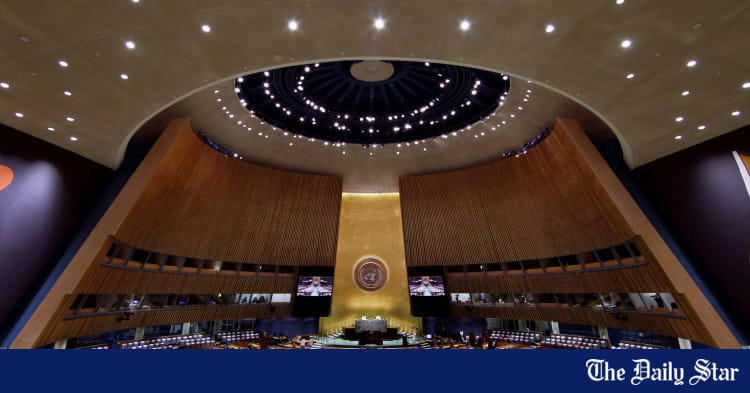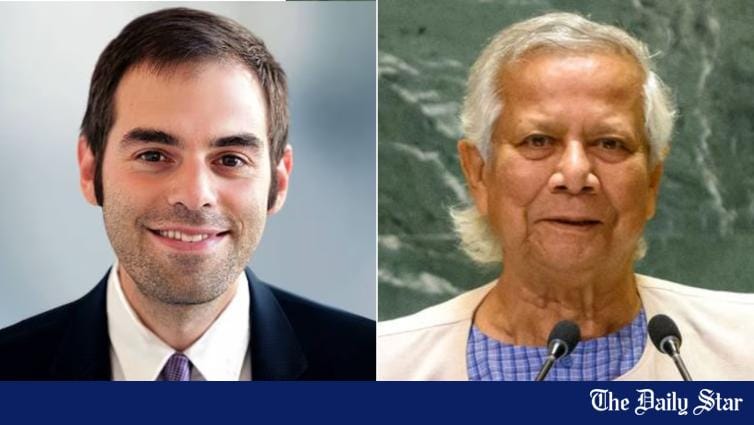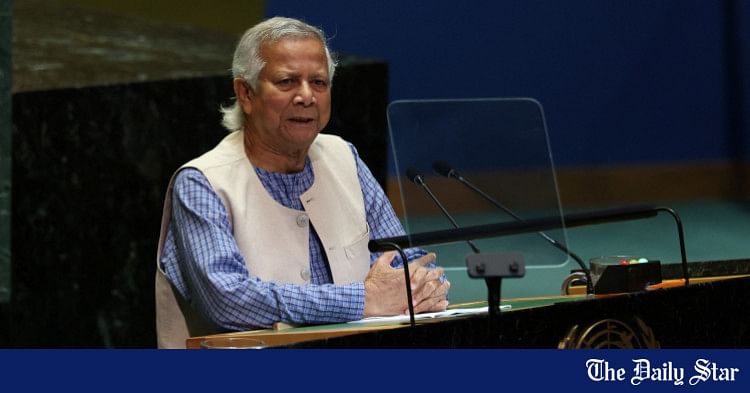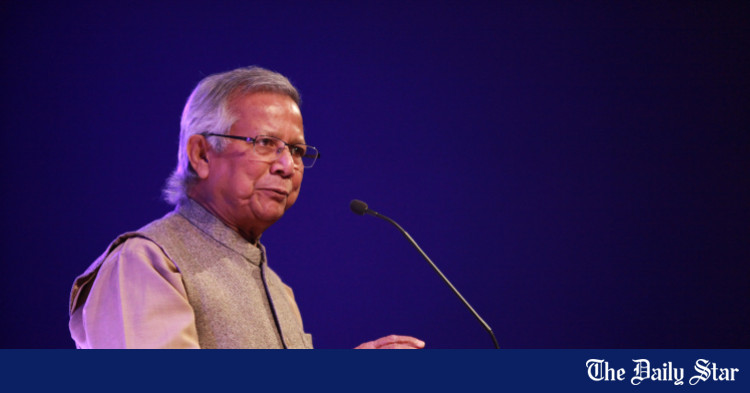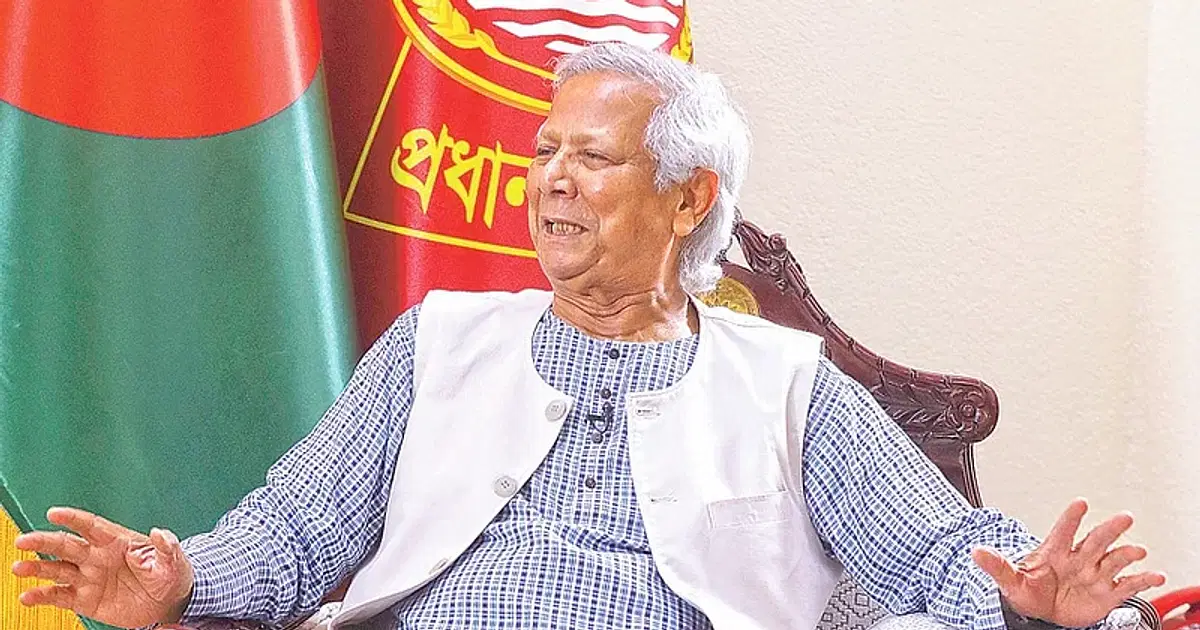High expectations from Dr Yunus's UNGA trip
Scope for improved relations and collaborations

VISUAL: STAR
For Bangladesh, the 79th session of the United Nations General Assembly (UNGA) holds more significance than usual as this is the first major global summit the country is taking part in following the fall of the Sheikh Hasina regime. Chief Adviser Prof Muhammad Yunus flew out of the capital at around 5:10am on September 23 to attend the UNGA, as well as a number of meetings. Given his international stature, we expect to see opportunities open up for Bangladesh to build meaningful, strategic collaborations that will help with its reform agenda in the short term, and with trade, economic growth and development in the long term.
The chief adviser is scheduled to address the UNGA on September 27, where he will present the context of the anti-discrimination student movement that evolved into a mass uprising in the face of state-sponsored violence, ultimately ending the 15-plus years of Sheikh Hasina's authoritarian rule. He is also set to highlight the reform initiatives that his government has undertaken, which we believe is a crucial part of his UNGA agenda. Presenting before the world our people's aspirations for a strong, fair and equitable justice system, impartial state machinery that serves only the people, and a democratic system where no one's voice is suppressed is key to gaining acceptance and cooperation from the international community—both at the government-to-government and people-to-people levels.
On the sidelines of the UNGA, the chief adviser is scheduled to meet US President Joe Biden on September 24. This meeting is considered significant as it's the reflection of US support for the interim administration in Bangladesh, according to diplomatic sources in New York. Plus, it's not usual for a US president to hold bilateral meetings during the UNGA. So, we hope to see a new strategic partnership emerge out of this meeting that will strengthen our ties with the US and protect our interests at the same time. Another high-level meeting is set to take place between Bangladesh Foreign Affairs Adviser Md Touhid Hossain and Indian External Affairs Minister S Jaishankar, which we expect to kick-start the process to normalise relations between the neighbouring countries after weeks of tension surrounding Hasina's fall and her being sheltered in India.
The chief adviser is also set to hold bilateral meetings with several heads of governments, and some of our strategic and development partners, including the EU. Bangladesh will also host a high-level reception on September 24, marking the 50th anniversary of its UN membership, and will attend a high-level side event on the Rohingya crisis.
As it goes through a massive transformation following the events of August 5, Bangladesh has yet to find an even footing. Our economy continues to struggle, our foreign exchange reserve crisis is still concerning, and our export earnings are still not up to the mark. Years of corruption and irregularities have left some lasting wounds, and to heal them, we need help from our partners. We hope the interim government will be able to garner the support needed to smoothen Bangladesh's reforms and aid in its interests moving forward.
Scope for improved relations and collaborations
VISUAL: STAR
For Bangladesh, the 79th session of the United Nations General Assembly (UNGA) holds more significance than usual as this is the first major global summit the country is taking part in following the fall of the Sheikh Hasina regime. Chief Adviser Prof Muhammad Yunus flew out of the capital at around 5:10am on September 23 to attend the UNGA, as well as a number of meetings. Given his international stature, we expect to see opportunities open up for Bangladesh to build meaningful, strategic collaborations that will help with its reform agenda in the short term, and with trade, economic growth and development in the long term.
The chief adviser is scheduled to address the UNGA on September 27, where he will present the context of the anti-discrimination student movement that evolved into a mass uprising in the face of state-sponsored violence, ultimately ending the 15-plus years of Sheikh Hasina's authoritarian rule. He is also set to highlight the reform initiatives that his government has undertaken, which we believe is a crucial part of his UNGA agenda. Presenting before the world our people's aspirations for a strong, fair and equitable justice system, impartial state machinery that serves only the people, and a democratic system where no one's voice is suppressed is key to gaining acceptance and cooperation from the international community—both at the government-to-government and people-to-people levels.
On the sidelines of the UNGA, the chief adviser is scheduled to meet US President Joe Biden on September 24. This meeting is considered significant as it's the reflection of US support for the interim administration in Bangladesh, according to diplomatic sources in New York. Plus, it's not usual for a US president to hold bilateral meetings during the UNGA. So, we hope to see a new strategic partnership emerge out of this meeting that will strengthen our ties with the US and protect our interests at the same time. Another high-level meeting is set to take place between Bangladesh Foreign Affairs Adviser Md Touhid Hossain and Indian External Affairs Minister S Jaishankar, which we expect to kick-start the process to normalise relations between the neighbouring countries after weeks of tension surrounding Hasina's fall and her being sheltered in India.
The chief adviser is also set to hold bilateral meetings with several heads of governments, and some of our strategic and development partners, including the EU. Bangladesh will also host a high-level reception on September 24, marking the 50th anniversary of its UN membership, and will attend a high-level side event on the Rohingya crisis.
As it goes through a massive transformation following the events of August 5, Bangladesh has yet to find an even footing. Our economy continues to struggle, our foreign exchange reserve crisis is still concerning, and our export earnings are still not up to the mark. Years of corruption and irregularities have left some lasting wounds, and to heal them, we need help from our partners. We hope the interim government will be able to garner the support needed to smoothen Bangladesh's reforms and aid in its interests moving forward.





